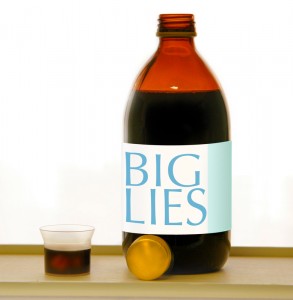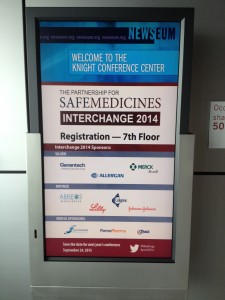by Tod Cooperman, MD, President, PharmacyChecker.com, and Gabriel Levitt, Vice President, PharmacyChecker.com | Aug 22, 2015 | Advocacy, Government, Internet Censorship, Pharmaceutical Industry

A paid “news release” this week by the Alliance for Safe Online Pharmacies (ASOP) and LegitScript and widely disseminated by PR Newswire’s MultiView – deceitfully and incorrectly associated PharmacyChecker.com with a federal indictment involving the wholesale operations of a Canadian company. [UPDATE: After PR Newswire was informed by our attorneys of the libelous nature of the ASOP/LegitScript news release, PR Newswire removed it. The release had appeared at http://www.multivu.com/players/English/7602051-asop-doj-indictment-prescription-drugs/ ]
A former consultant to PharmacyChecker.com was, unfortunately, swept up in this indictment for an action having nothing to do with his work with PharmacyChecker.com (see our posting about the indictment) [UPDATE: The charges against this individual were dismissed on October 20].
But even though PharmacyChecker, nor any of its executives or employees, are the subject of the recent indictment or even mentioned in it, ASOP and LegitScript, who we see as sharks for Big Pharma and Big Pharmacy, could not resist throwing a public relations party, which we believe is aimed at manipulating the media and reporters, government, and worse – consumers! It appears that they spent a lot of money on a PR firm, ECI Communications, to put together and disseminate lies about PharmacyChecker.com and misleading information about international online pharmacies.
Want proof? After reading ASOP and LegitScript’s deceitfully misleading news release, a writer at the publication Medicine Marketing & Media was apparently duped into writing on Wednesday that PharmacyChecker was being indicted! After we contacted that publication about the inaccuracy, we were swiftly given an apology, the article was corrected, and the following statement posted: “CORRECTION: An earlier version of this story incorrectly listed PharmacyChecker.com as a defendant. PharmacyChecker.com is not a defendant in the case.
A renowned expert in First Amendment Law considers the news release “libelous” and ASOP, LegitScript, and ECI have been asked to take it down. PR Newswire has also been asked to remove it, as it appears to violate PR Newswire’s own guidelines regarding libelous content and this certainly doesn’t help their existing reputation for distributing “low quality content.” However, perhaps due to the enormous funding behind these groups, they have yet to make any attempt to correct the situation. We’ll see how much they care about the truth by their actions.
It’s important to keep in mind who these groups are. ASOP’s members and funders include large pharmaceutical companies and the National Association of Chain Drugstores. To protect their bottom lines, these companies and ASOP lobby congress and federal agencies, such as the FDA, to try to curtail your access to much more affordable and safe medication from outside the U.S. In fact, ASOP is actually located in the offices of the government relations and communications consulting firm FraegreBD, where ASOPs executive director, also happens to be a Vice President. And ECI Communications is a PR firm which does extensive business for U.S. pharmaceutical companies. Of course LegitScript.com happens to be a founding member of ASOP. Can we trust LegitScript.com or ASOP? Well, you already know who ASOP works for, right? On the other hand, much of LegitScript.com’s income is from a contract with the FDA for $5.2 million. That’s not bad in and of itself but, if that money is being used to spread misinformation to U.S. consumers and lobby congress and maybe even the FDA itself, then that stinks.
The truth is that American consumers are buying medication from outside the U.S., five million of them each year, because many of them can’t afford prices in the U.S. Since 2003, PharmacyChecker.com has been working hard to publish information that helps Americans find safe and affordable medication from these pharmacies. Yet it seems the only safe online pharmacy to ASOP is one that is approved by LegitScript.com, which in turn believes that every pharmacy outside the U.S. that sells into the U.S. including licensed pharmacies in Canada, are not “legitimate” or are “rogue.”
ASOP’s and LegitScript’s vision of “legitimacy” is a nightmare for Americans! Thirty-five million Americans don’t fill a script each year because of cost. A safe online pharmacy is not safe for a consumer who can’t afford the medications it sells. ASOP, LegitScript, the NABP, FDA, etc., can’t wish away the fact that safe international online pharmacies are a lifeline for many American consumers. Scaring these Americans away from safe pharmacy options with misleading and false information means that more Americans will go without their prescribed medications. There is nothing “safe” or “legit” about that.
Tagged with: Alliance for Safe Online Pharmacies, ASOP, Big Pharma, consumers, indictment
by Gabriel Levitt, President, PharmacyChecker.com and Prescription Justice | Jul 24, 2015 | Advocacy, Cancer Drugs, Government, Personal Drug Importation, Pharmaceutical Industry, Policy
Yesterday, in the New York Times, Andrew Pollack reported on the swelling chorus of groups, politicians, and consumers who are sickened by the price of cancer drugs and medication costs generally. They are calling for pharmaceutical companies to justify the outrageous costs of medication.
As part of this swell of frustration and anger about drug prices, over 100 oncologists are calling for the U.S. government to take concrete steps to bring down the prices on expensive cancer medications, many which cost over $100,000/year. One of those steps is allowing importation of cancer drugs across borders for personal use. (What a novel idea!). Despite the federal restrictions on the practice, five million Americans already import prescription drugs for personal use because the costs of medicine are too high domestically. The imports help people afford medications that they would otherwise go without. While people are not prosecuted for doing so as long as the imports are for personal use, expressly legalizing safe prescription importation from licensed pharmacies in other countries is a great idea for all medications, not just cancer medications, and would probably cause medication prices to fall at U.S. pharmacies.
Personal drug importation is just one step among several that doctors are calling on to improve access to affordable cancer medication. Others include allowing Medicare to negotiate drug prices like the Veteran’s Administration does; banning deals (“pay-to-delay”) between brand and generic drug companies, in which the former pays off the latter to postpone introducing a lower cost generic drug; and reigning in patent terms so that lower cost generics can come to market faster.
In reading the New York Times article, the tone of criticism reported on was veering toward visceral disgust that so many seem to have with the pharmaceutical industry. But the Wall Street Journal was on this issue, too. In “Doctors Object to High Cancer Drug Prices,” Jeanne Whalen writes: “The doctors focus attention on the financial burden to patients, saying the out-of-pocket costs are bankrupting many just as they’re fighting a deadly illness.”
To conclude, recall that last month we brought you a real story of an American family facing financial ruin due to the cost of a cancer medication. Lisa wrote:
“We are going broke, will probably lose our home and my husband will probably never be able to retire (even though his body is breaking down from 40+ years of a very physical job as a pipe fitter. I (the wife), am permanently disabled. We will die homeless before this drug ever comes within an affordable price.
“Why doesn’t anyone bring this to the press? Why does Congress and Obamacare turn a blind eye? How many hundreds have to die before this drug and options are researched.”
The media coverage mentioned in this post shows that people are bringing this to the press. It’s exactly the press coverage that Lisa and her family deserve, not to mention the tens of millions of Americans who don’t fill prescriptions each year because of cost! Now will the government do something or are they too under the yoke of the pharmaceutical industry lobbying juggernaut?
by Gabriel Levitt, Vice President, PharmacyChecker.com and Sam Werbalowsky, Pharmacychecker.com | Mar 13, 2015 | Drug Prices, Generic drugs, Pharmaceutical Industry, Specialty Drugs
A new report by Express Scripts has found that medication spending by commercial health plans grew by 13.1% last year, primarily due to the release of high cost Hepatitis C meds. Spending also increased significantly for compounded drugs. In the prior decade, total spending ranged between three and six percent.
Keep in mind that the headline statistic of 13.1% applies to how much was spent on drugs; it actually doesn’t tell us anything about the prices of the drugs. If drug utilization, which refers to the amount of drugs taken, increases while prices stay the same, then there’s more spending. As it turns out, utilization decreased by a marginal 0.1 % and d prices increased by 13.2%, demonstrating that drug costs were the primary cause of increased drug spending. In fact, a vice president at Express Scripts referred to the drug price increases as “unprecedented and unsustainable.”
Specialty drugs, which often require careful handling, administration, or monitoring, saw a dramatic 30.9% increase in spending. As mentioned earlier, spending on hepatitis C treatments was the primary driver in overall spending, skyrocketing by 742.6%. Other notable (though nowhere near even 100%) increases include 20% for oncology drugs, 24% for treatments for inflammatory conditions, and 17% for hemophilia drugs. It’s not uncommon for these medications to cost many thousands, even tens of thousands of dollars per month. Sovaldi, a hep C drug, costs $1,000 per pill. We covered the Sovaldi saga in depth.
The story for traditional medications, such as those commonly used to treat asthma, depression, diabetes, GERD, high cholesterol, and pain is much more mixed. Despite drug prices rising by 6.4% overall, prices dropped for five out of ten therapy classes. Depression medication prices, for example, plummeted by 18%. Interestingly, the report noted compound drugsas a therapy class, even though they treat a variety of conditions. These drugs had an unusually large price increase of 128%! Excluding compound drugs, drug prices for traditional meds were up only 2.3%. (more…)
Tagged with: AbbVie, Express Scripts, Gilead Sciences, Harvoni, Hepatitis C, Sovaldi
by Gabriel Levitt, Vice President, PharmacyChecker.com and Sam Werbalowsky, Pharmacychecker.com | Nov 11, 2014 | Drug Prices, Online Pharmacies, Pharmaceutical Industry
Last June we wrote about how Americans taking Nexium – AstraZeneca’s multibillion dollar proton pump inhibitor that treats gastro esophageal reflux disease (GERD) – were losing out on savings due to the FDA’s postponement of a generic version in the U.S. market. Well, it looks like they’re going to wait even longer to find generic copies of the Purple Pill at local pharmacies (and the generic versions probably won’t be purple!). Initially, Indian pharmaceutical company Ranbaxy held exclusive marketing approval to sell generic Nexium in the U.S., but they were banned from actually selling it due to poor manufacturing practices. Well, last week the FDA revoked both Ranbaxy’s approval and its marketing exclusivity for generic Nexium. That might be good for the Purple Pill’s profits (say it fast) – but it leaves consumers singing the blues.
Cash paying Americans are left with the following domestic options: Prescription-strength (40 mg), Nexium or Nexium OTC (20 mg). Prescription-strength Nexium will run you about $600 for 60 pills. That’s a ridiculous price. It’s only $70 to get 126 capsules of Nexium OTC! So, can you just buy Nexium OTC instead of prescription-strength Nexium and just take two pills?
You might be able to, but you need to ask your doctor, pharmacist, or other healthcare provider. I asked my local pharmacist if I could just take OTC Nexium instead, and without hesitation she said I could, but that it may not be as effective and that it comes as a tablet rather than a capsule. The OTC version also has different inactive ingredients, I was told, so if you are allergic to any of those, you should stick with the 40 mg version. She suggested OTC Nexium if I couldn’t make a trip to my doctor or if my insurance didn’t cover prescription Nexium. Even if Nexium is covered, it might be a tier 2 or 3 drug, which could result in your co-pay being higher than the OTC cost.
We’d feel remiss in not reminding you that there are a plethora of proton pump inhibitors on the U.S. market, many that come at a much lower price tag.
But if you need to stick with prescription-strength 40 mg Nexium, it is available from international online pharmacies: 60 pills would be about $50, so it’s actually a better deal than Nexium OTC in the U.S. It’s worth noting that just like the OTC 20 mg pill, the 40 mg purple pill is sold as a tablet, not a capsule, in many foreign markets. You can view our comparisons of Nexium prices.
Hopefully we see these delays sorted out, and a generic version of 40 mg Nexium finally come to market in America. Until then, Nexium OTC at your local drugstore or ordering from an international online pharmacy may be your best options to avoid the drug price blues.
Tagged with: AstraZeneca, Nexium, Nexium OTC, Ranbaxy
by Gabriel Levitt, President, PharmacyChecker.com and Prescription Justice | Oct 9, 2014 | FDA, Online Pharmacies, Pharmaceutical Industry

Drug Companies Front and Center at PSM Interchange Conference
Two weeks ago I brought you some highlights of the PhRMA-led Partnership for Safe Medicines (PSM) Interchange propaganda show, which was held on September 18th. Look over to the left. See that picture. Those logos of big pharmaceutical companies make it abundantly clear who is pushing the distorted message of PSM about personal drug importation and online pharmacies.
I’m not joking about the word “propaganda” applied to the PSM event. The online Merriam Webster dictionary provides the following definition for that word: “ideas or statements that are often false or exaggerated and that are spread in order to help a cause, a political leader, a government, etc.” In this case, as I see it, the “cause” of PSM is the commercial agenda of the pharmaceutical and U.S. pharmacy industries cynically couched behind terms of patient safety. A central message of PSM is that Americans are risking their lives buying medication online from other countries and that there is no way to do so safely. Those are false and exaggerated messages that are potentially leading lawmakers and regulators to overreact and scare Americans from a potential lifeline of affordable prescription drugs. Evidence shows that this has been PhRMA’s communications strategy for more than a decade. (more…)
Tagged with: Counterfeit Drugs, daniel burke, FDA, Interchnage, laganga, Mississippi AG hood, OCI, Partnership for Safe Medicines, phrma, PSM
by Gabriel Levitt, President, PharmacyChecker.com and Prescription Justice | Sep 26, 2014 | Advocacy, Online Pharmacies, Pharmaceutical Industry
 In George Orwell’s famous novel 1984, published in 1949, we find a future in which totalitarian, one-party rule has run amuck on a global scale. It is a world in which whatever “The Party” (think Communist or Nazis) states is a fact must be believed, regardless of the obtuse logic and propagandistic origins of that so called “fact.” The quintessential and frightening example provided by Orwell is the notion that 2+2=5 if The Party Say’s so. When I attended the Partnership for Safe Medicines (PSM) conference last week, it felt as if many people were willing to believe absurd notions about online pharmacies. Most positions espoused at PSM’s conference support the following fallacious statement: IF an online pharmacy is not based in the U.S. and sells prescription drugs to the U.S. THEN it is dangerous. They essentially put on a show in which different people in a myriad of ways communicate that 2+2=5.
In George Orwell’s famous novel 1984, published in 1949, we find a future in which totalitarian, one-party rule has run amuck on a global scale. It is a world in which whatever “The Party” (think Communist or Nazis) states is a fact must be believed, regardless of the obtuse logic and propagandistic origins of that so called “fact.” The quintessential and frightening example provided by Orwell is the notion that 2+2=5 if The Party Say’s so. When I attended the Partnership for Safe Medicines (PSM) conference last week, it felt as if many people were willing to believe absurd notions about online pharmacies. Most positions espoused at PSM’s conference support the following fallacious statement: IF an online pharmacy is not based in the U.S. and sells prescription drugs to the U.S. THEN it is dangerous. They essentially put on a show in which different people in a myriad of ways communicate that 2+2=5.
The event, called the PSM Interchange, is a Lion’s Den with many people who are directly paid by drug companies, indirectly paid by drug companies, U.S. pharmacies or their trade groups, or those who would like to be paid by the aforementioned entities someday, either directly or indirectly. PSM’s stated mission, “working together to protect the safety of your prescription drugs,” is, it seems, a smoke screen for big drug companies working together to keep drug prices as high as possible in their most cherished market – America. (more…)
Tagged with: CanaRx, Kenneth "mac" McCall, Libby Baney, Maine, Partnership for Safe Medicine, Peter Pitts, phrma, PSM, Todd Brown





